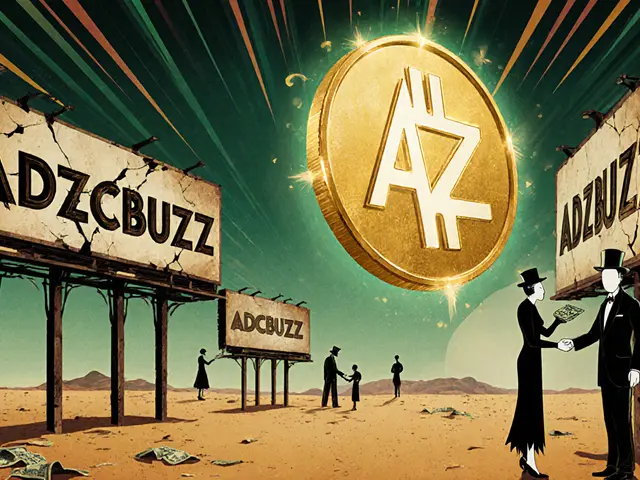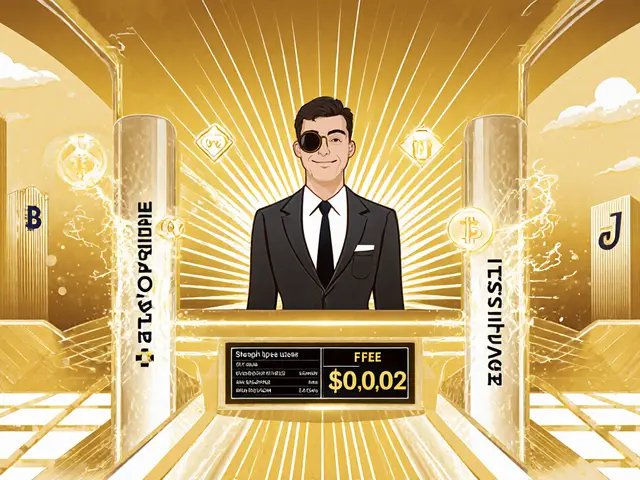JOD to USDT Converter for Jordan
Convert JOD to USDT
USDT Equivalent
Why this matters: Stablecoins like USDT help preserve savings against inflation. Before the 2025 law, many Jordanians used USDT as a store of value since the dinar was losing value against the dollar. Now, with regulated platforms, you can safely convert JOD to USDT through licensed exchanges.
Important: This is for illustrative purposes only. Exchange rates fluctuate. Always check the latest rate on licensed platforms approved by the Jordan Securities Commission (JSC).
Before September 2025, if you were a Jordanian who wanted to buy Bitcoin or trade Ethereum, you couldn’t do it through your bank. Not even close. The Central Bank of Jordan had made it clear: cryptocurrencies were banned from the formal financial system. No exchanges, no crypto deposits, no wire transfers to Binance or Coinbase. But people still traded. How? They didn’t wait for permission. They found a way.
Trading in the Shadows
Jordanians didn’t have access to licensed crypto platforms. No regulated exchanges, no licensed wallets, no official payment gateways. So they turned to peer-to-peer (P2P) markets. These weren’t apps you downloaded from the App Store. They were WhatsApp groups, Telegram channels, and Facebook pages where buyers and sellers connected directly. Someone in Amman would send cash to someone in Irbid through a trusted friend. In return, they’d get a Bitcoin wallet address loaded with the amount they paid. No bank involved. No paper trail. Just trust and timing.This system worked because it bypassed the banking system entirely. You didn’t need a bank account to trade crypto-you just needed a phone, a wallet, and someone willing to meet you in a café. Some traders used cash deposits at money transfer services like Western Union or MoneyGram, then sent the crypto from their wallet to the buyer’s address. Others traded via gift cards, using platforms like Paxful or LocalBitcoins to swap Bitcoin for Amazon or iTunes vouchers.
It wasn’t perfect. There were scams. People got burned. One trader in Zarqa lost $3,000 after sending cash to someone who disappeared. Another in Madaba had their wallet hacked after sharing a private key over WhatsApp. But for many, the risk was worth it. Crypto wasn’t just speculation-it was a lifeline. With inflation eating into savings and the Jordanian dinar losing value against the dollar, people saw Bitcoin and USDT as a way to protect what they had.
Why the Banks Said No
The Central Bank of Jordan’s stance wasn’t random. They worried about money laundering, fraud, and the lack of consumer protection. Cryptocurrencies moved fast, anonymously, and across borders. Traditional banks couldn’t track them. They also feared volatility. Imagine depositing your salary in dinars, then watching half your crypto savings vanish overnight. The CBJ didn’t want that chaos in Jordan’s fragile economy.But their ban had an unintended effect: it pushed crypto underground. While countries like the UAE and Bahrain built regulated exchanges and attracted crypto talent, Jordan lost its brightest fintech minds. Talal Tabbaa, who later founded CoinMENA, left Jordan in 2018 because he couldn’t build a crypto business at home. He wasn’t alone. Dozens of developers, engineers, and entrepreneurs moved to Dubai, Singapore, or Europe because Jordan’s rules made innovation impossible.
The Underground Economy
Before the 2025 law, Jordan had one of the highest crypto adoption rates in the Middle East relative to population size. According to Chainalysis, Jordan ranked in the top 10 globally for P2P crypto volume per capita in 2024. That’s not because Jordanians were more speculative than others-it’s because they had no other choice. With limited access to international banking, high remittance costs, and few investment options, crypto became the only tool that worked.Stablecoins like USDT were especially popular. They traded at near-parity with the U.S. dollar, so people used them to store value, send money to family abroad, or buy goods from international sellers. A teacher in Salt could pay for an online course in English using USDT, even if their bank blocked the transaction. A small business owner in Aqaba could receive payments from clients in Germany without waiting weeks for a wire transfer.
Even local shops started accepting crypto. A coffee shop in downtown Amman began taking Bitcoin as payment after the owner’s son showed him how to use a mobile wallet. No bank needed. No merchant account. Just a QR code on the counter. These weren’t legal under the old rules-but no one was enforcing them.

The Turning Point: Law No. 14 of 2025
On September 14, 2025, everything changed. King Abdullah II signed the Virtual Assets Transactions Regulation Law. For the first time, crypto wasn’t banned-it was regulated. The Jordan Securities Commission (JSC) became the official overseer. Now, any company wanting to operate a crypto exchange, custody service, or payment platform had to apply for a license. They needed a physical office in Jordan, anti-money laundering systems, and KYC checks.The law defined virtual assets clearly: Bitcoin, Ethereum, USDT, NFTs with economic value-all covered. But digital securities and central bank digital currencies were excluded, keeping existing financial rules intact. The goal? Bring crypto out of the shadows. Make it safe. Make it legal. Make it local.
Within weeks, CoinMENA applied for a license. Other regional players followed. The JSC started approving applications. By November 2025, Jordan had its first two licensed crypto exchanges. For the first time, a Jordanian could open an account with a local platform, deposit dinars via bank transfer, and buy crypto without breaking any rules.
What Changed After the Law
The shift wasn’t just about legality-it was about trust. Before, you had to know someone to trade crypto. Now, you could use an app. Before, you risked losing your money to a scammer. Now, licensed platforms had insurance and audit trails. Before, you had to leave the country to build a crypto business. Now, you could start one in Amman.One of the biggest changes? Bank accounts started working with licensed exchanges. The Central Bank didn’t reverse its ban-it adapted. Now, banks can process payments to JSC-licensed VASPs. That means you can link your bank account to a local crypto platform and buy Bitcoin with a single tap.
The underground P2P networks didn’t disappear overnight. Some traders still use them-especially older users who don’t trust apps or younger ones who want to avoid KYC. But the tide has turned. More people are moving to regulated platforms because they’re safer, faster, and cheaper.

What’s Next for Jordan?
Jordan’s move puts it ahead of most of its neighbors. Kuwait and Egypt still ban crypto. Iraq has no framework. But Jordan now has a clear path. The JSC is already working on rules for DeFi, staking, and tokenized assets. Startups are popping up in Amman’s innovation hubs. Young coders who once left for Dubai are coming back.The real win? Jordanians no longer have to choose between breaking the law and missing out. They can now participate in the global crypto economy without fear. The banking restrictions didn’t stop crypto-they just delayed it. Now, with regulation in place, Jordan isn’t catching up. It’s joining the future.
How to Trade Crypto in Jordan Today
If you’re in Jordan now and want to trade crypto legally:- Check the Jordan Securities Commission website for a list of licensed virtual asset service providers.
- Choose a licensed exchange-most offer dinar deposits via bank transfer.
- Complete their KYC process (ID, proof of address, selfie).
- Deposit Jordanian dinars directly from your bank account.
- Buy Bitcoin, Ethereum, or USDT with a few clicks.
Don’t use unlicensed platforms. Don’t send money to strangers over WhatsApp. The old risks are still there-but now you have a better option.
Is crypto legal in Jordan now?
Yes. Since September 14, 2025, crypto trading, investing, and payments are legal under Law No. 14 of 2025. Only platforms licensed by the Jordan Securities Commission can operate. Unlicensed services are still prohibited.
Can I use my Jordanian bank account to buy crypto?
Yes, but only if you’re using a licensed exchange. Banks now allow transfers to JSC-approved platforms. You can’t send money to Binance or Kraken directly-you need to go through a local, regulated provider.
What happened to P2P trading in Jordan?
P2P trading still exists, but it’s declining. Many users are switching to licensed exchanges because they’re safer, faster, and now legally protected. The government is cracking down on unlicensed platforms, so relying on WhatsApp traders carries legal risk.
Are stablecoins like USDT allowed in Jordan?
Yes. USDT and other non-central-bank-issued stablecoins are classified as virtual assets under the new law. They can be traded, held, and used for payments through licensed platforms.
Can I start a crypto business in Jordan now?
Yes. The law allows local startups to apply for licenses as crypto exchanges, custodians, or payment providers. You must have a registered office in Jordan and meet strict compliance standards. Many local entrepreneurs are already applying.




Allison Doumith
November 4, 2025 AT 00:47They didn't need banks to be brave
They just needed each other
That's the real story here
Not the law
Not the tech
But people refusing to be silenced
Scot Henry
November 5, 2025 AT 19:45Man i remember when my cousin in Amman used to send me USDT via WhatsApp just so i could buy steam cards. no bank involved. just trust and a coffee shop meetup. wild times.
Sunidhi Arakere
November 7, 2025 AT 11:41This is very interesting. People find ways even when rules say no. Jordanians showed strength. Now law is here, it is good.
Vivian Efthimiopoulou
November 9, 2025 AT 05:19The quiet revolution of the Jordanian crypto underground is one of the most profound examples of human resilience in the face of institutional rigidity.
When a state withdraws its trust from its people, the people build their own systems of faith - not with institutions, but with wallets, WhatsApp groups, and whispered promises in Amman cafés.
This wasn’t about speculation. It was about sovereignty - the sovereignty of the individual over their own economic dignity.
The Central Bank feared volatility, but it forgot that the greatest volatility of all is the erosion of hope.
And so the Jordanians, in their quiet defiance, chose hope over fear - and in doing so, they didn’t just trade crypto.
They redefined what it means to be financially free in a world that insists on permission.
Law No. 14 didn’t legalize crypto.
It finally caught up to the people who were already living its promise.
Angie Martin-Schwarze
November 9, 2025 AT 22:02i legit cried reading this. my uncle in zarqa lost 3k and i never talked to him again. still feels like a wound. but now? now i feel like maybe we can heal.
Fred Kärblane
November 10, 2025 AT 06:23Decentralized finance was never about the tech - it was about disintermediating the gatekeepers. Jordan’s underground P2P networks were a textbook case of DeFi in the wild. No KYC, no CDD, no intermediaries - just peer-to-peer value transfer at the edge of the system. The law didn’t kill the underground - it institutionalized the innovation. Now we’re seeing real composability with local banking rails. That’s the future.
Janna Preston
November 11, 2025 AT 16:06Wait so can you still use USDT to pay for stuff in Jordan now? like at the coffee shop? or did the law make that illegal again?
Meagan Wristen
November 13, 2025 AT 08:47I love how this story shows that regulation doesn’t have to mean control - it can mean inclusion.
So many countries treat crypto like a threat, but Jordan treated it like a community that was already there - waiting to be welcomed in.
It’s not about banning the wild west.
It’s about building a town square where everyone can gather safely.
Thank you for sharing this. It gave me hope.
Becca Robins
November 14, 2025 AT 09:03so like… the law came and now we all gotta do the thing? 😭 i just wanted my crypto and my peace
also why do i have to upload my face again?? 🥲
Alexa Huffman
November 15, 2025 AT 14:14This is one of the most beautifully written pieces on crypto adoption I’ve ever read. The way you captured the human side - the cafés, the WhatsApp trades, the coffee shop with the QR code - it’s all so real. Thank you for honoring the quiet heroes who kept the network alive.
gerald buddiman
November 16, 2025 AT 13:59My brother was in Jordan in 2023 - he told me about a guy who traded BTC for gold bracelets. Can you believe that? Gold for Bitcoin. In a parking lot. No paperwork. Just a handshake and a phone call. I mean… what even is money anymore? The system is broken. And these people fixed it themselves.
Arjun Ullas
November 17, 2025 AT 16:58The regulatory framework established by the Jordan Securities Commission represents a model of prudent innovation. It balances financial stability with technological progress. The inclusion of stablecoins under the definition of virtual assets is particularly commendable, as it acknowledges the practical utility of USDT in remittances and inflation hedging. This is not merely legal reform - it is economic statecraft at its finest.
Steven Lam
November 19, 2025 AT 04:18People broke the law and now we’re supposed to celebrate it? What’s next? Robbing banks is fine if you’re ‘resourceful’? The system works because rules exist. Stop romanticizing chaos.
Noah Roelofsn
November 20, 2025 AT 02:08Jordan didn’t just legalize crypto - it turned a black market into a blue ocean. The P2P networks were the prototype. The licensed exchanges are the product-market fit. And the real MVP? The coffee shop owner who took Bitcoin because his son showed him how. That’s the kind of organic adoption no regulator can engineer. This isn’t just policy - it’s culture catching up to technology.
Sierra Rustami
November 21, 2025 AT 21:25They traded crypto because they had to. Not because they wanted to. Now they have a choice. Good. Let them use the bank like normal people.
Glen Meyer
November 22, 2025 AT 13:45So now the government gets to tax it, track it, and control it. That’s not freedom. That’s just a new cage with better branding. The real winners were the ones who did it on their own. The rest? Just sheep in a new pasture.